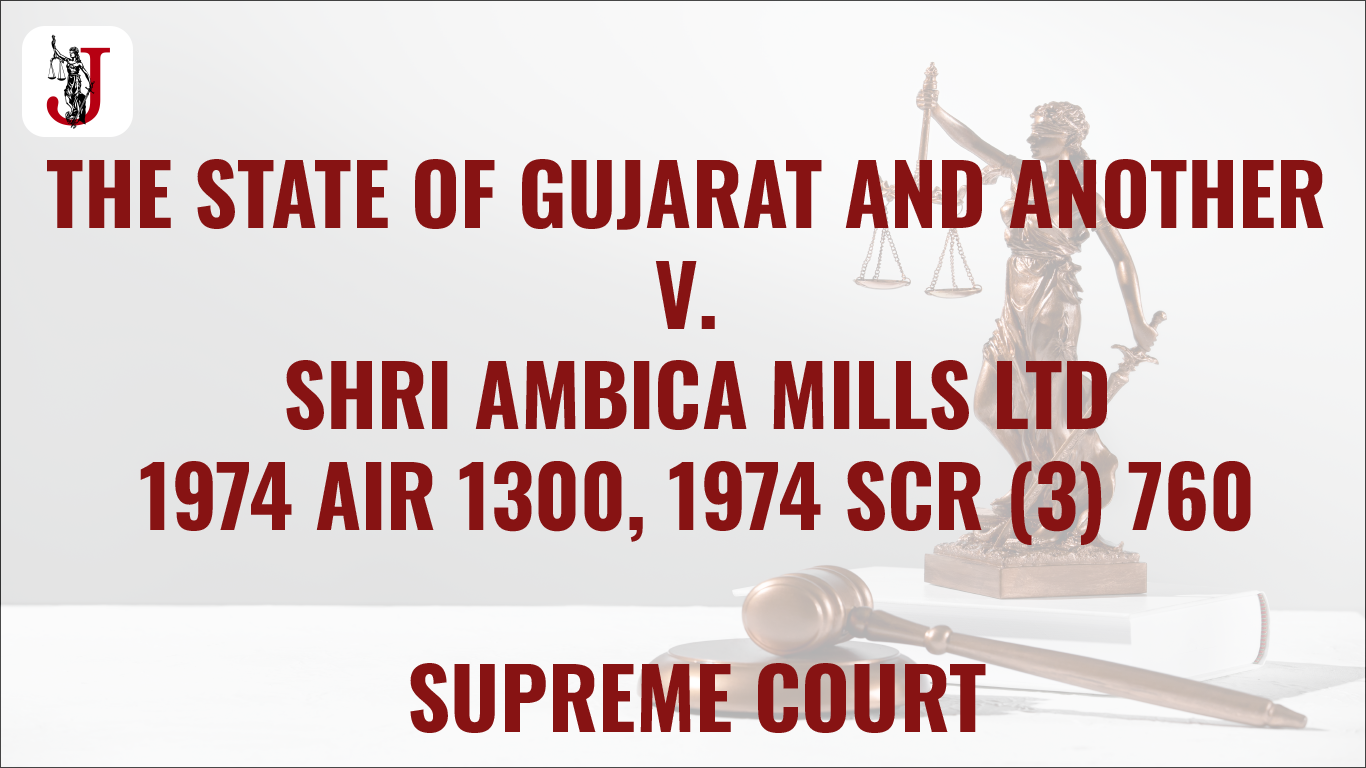1974 AIR 1300, 1974 SCR (3) 760
Fact
The State of Bombay was in 1960 bifurcated into two state i.e., Maharashtra and Gujarat.
The Gujarat government amended the Bombay Labour Welfare Fund (Gujarat Amendment Act), which states that the state government shall constitute a fund called the Labor Welfare Fund and that the Fund shall consist of all unpaid accommodations, which means all payments due to the employees but not claimed by them within a period of three years from the date. These unpaid dues were to be collected by government, and if employees could not claim those dues from the government within four years, then that fund would be used for labour welfare.
Ambika Mills challenged the Bombay Labour Welfare Fund Rules, 1953 (the Rules) at the High Court as unconstitutional.
Decisions of the High Court
The High Court held that the provisions of Sections 3(1) and 3(2) of the Bombay Labour Welfare Fund Rules, 1953 (the Rules) were invalid on the ground that they violated the fundamental right of the employer under Article 19(1)(f), which provides us with the right to acquire, hold, and dispose of property.
The High Court also said that without discharging the employer from his liability to the employees, Section 3(1) therefore operated to take away the money of the employer without releasing him from his liability to the employees. Thus, the rule was declared void by the High Court.
During the pendency of the writ petition before the High Court, the Gujarat Legislature passed the Bombay Labour Welfare Fund (Gujarat Amendment) Act, 1962, on January 5, 1963 (Second Amendment Act) and added Section 6A (1), where it was declared that unpaid accumulations shall be deemed to be abandoned property.
Now the matter has come before the Supreme Court.
Issue
The main issue in this case was whether the first respondent, a company registered under the Companies Act, was competent to challenge the validity of the impugned provision on the basis that they violated the fundamental rights under Article 19 of the Constitution—employers or employees?
Supreme Court Judgement
The Supreme Court said that there is a violation of fundamental rights. But the fundamental rights are only guaranteed to the citizens, not to the corporation. It is settled that a corporation is not a citizen for the purposes of Article 19 of the Constitution, and there has been no violation of fundamental rights. Thus, the rule can’t be claimed as void.
Conclusion
In conclusion, it can be said that the Supreme Court in this case gave a clear description of the citizen and how this was different from others.
Youtube facebook whatsapp web weather translate google amazon gmail google translate Instagram cricbuzz traductor Hotmail restaurants satta king tiempo twitter googel maps Yandex Sarkari result clima hotels fb yahoo maps chatgpt yahoo mail weather tomorrow Netflix roblox nba wordle tradutor livescore premier league ibomma speed test canva pintrest outlook Instagram login omegle flipkart myntra paypal paytm Alibaba ebay lottery sambad linkedin tiktok shein bbc news real madrid gmail login Walmart ikea cricket snaptik flashscore English to hindi twitch google scholar Barcelona Sarkari Naukri matrimonial shadi lgbtq third gender woman children Advocate barrister vakil supreme court high court commissioner exams ll.b ll.m ugc net law ph.d. m.b.a. graduation degree certificate school additional session judge civil judge justice jurists crime criminology punishment capital sentence death warrant fine constitution of india criminal procedure code civil procedure code evidence act sale of goods act arbitration act all india bar exam lower judiciary higher judiciary additional district attorney contract act amendment act u.s. constitution Canada p r section article schedule judgment vacancy post Porsche louis Vuitton chanel Gucci Hermes dior cartier rolex titan tiffany & co Ferrari estee lauder coach lancome burberry prada omega yves saint Laurent Lamborghini ray-ban Armani Moncler tata reliance Givenchy celine Bentley tag Heuer sk-II can cleef & arpels bulgari Shangri-la lao feng xiang dabur baidyanath cipla birla monte carlo loewe rolls-royce bottega-veneta jaege-leCoulture Maserati valentino dolce & gabbana Salvatore Ferragamo sulwhasso tom ford Maruti Suzuki Hyundai kia intercontinental Tissot aston martin ysl beauty fendi Versace kenzo la mer longines gold price sensex human rights pollution
